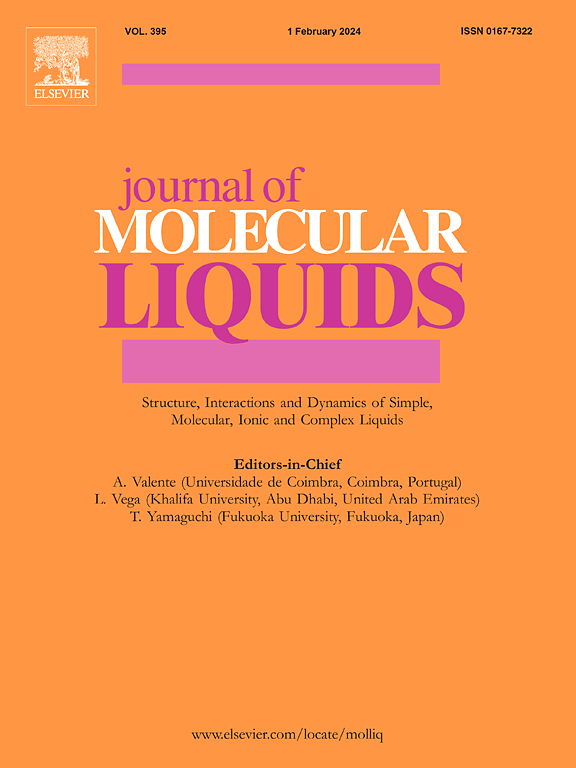利用多光谱和分子对接方法研究三叶草苷与胃蛋白酶和胰蛋白酶的相互作用机理
IF 5.3
2区 化学
Q2 CHEMISTRY, PHYSICAL
引用次数: 0
摘要
胃蛋白酶和胰蛋白酶在人体内消化蛋白质方面具有显著作用。Trilobatin 是一种二氢查耳酮,具有抗肥胖、抗氧化和抗糖尿病的功能。目前,还没有人对三叶草苷与胃蛋白酶或胰蛋白酶的相互作用进行研究。因此,本研究采用了荧光光谱法、同步荧光光谱法、紫外可见光谱法、傅立叶变换红外光谱法、圆二色光谱法和分子对接法等多种方法来研究曲洛巴丁与胃蛋白酶或胰蛋白酶之间的相互作用。在曲洛巴丁与胃蛋白酶或胰蛋白酶的相互作用过程中,淬灭类型为静态淬灭,存在单一结合位点。在 298 K 下,三叶铂-胃蛋白酶和三叶铂-胰蛋白酶体系的结合常数(Ka)值分别为 2.177 和 3.028 × 104 L/mol。然而,金属离子(Zn2+、Ca2+ 和 K+)的存在会降低三氯铂与胃蛋白酶和胰蛋白酶的结合力。三叶草苷与胃蛋白酶之间的复合物通常是通过氢键和范德华力(ΔH° < 0和ΔS° < 0)产生的,相比之下,三叶草苷与胰蛋白酶之间的复合物主要是通过氢键和疏水力(ΔH° > 0和ΔS° > 0)建立的。紫外可见光谱、同步荧光光谱、傅立叶变换红外光谱和光盘光谱的数据表明,三氯铂降低了胃蛋白酶和胰蛋白酶酪氨酸(Tyr)残基的疏水性。此外,三氯铂还改变了胃蛋白酶和胰蛋白酶的二级结构。同时,三氯铂还改变了胃蛋白酶和胰蛋白酶的构象,使相互作用体系的粘度随着三氯铂浓度的增加而降低。通过分子对接建模发现,三氯铂与胃蛋白酶和胰蛋白酶周围的氨基酸残基相互作用。这项研究一致表明了三叶铂与胃蛋白酶或胰蛋白酶之间的相互作用,并为三叶铂的应用提供了有价值的信息。本文章由计算机程序翻译,如有差异,请以英文原文为准。
Investigation on the interaction mechanism of trilobatin with pepsin and trypsin by multi-spectroscopic and molecular docking methods
Pepsin and trypsin are noteworthy for the digestion of proteins in the human body. Trilobatin is a dihydrochalone that has anti-obesity, antioxidant, and anti-diabetes functions. The interaction of trilobatin and pepsin or trypsin is not currently being explored. Therefore, in this research multiple methods involving fluorescence spectroscopy, synchronous fluorescence spectroscopy, ultraviolet–visible (UV–Vis) spectroscopy, Fourier transform infrared (FT-IR) spectroscopy, circular dichroism (CD) and molecular docking were employed for studying the interaction between trilobatin and pepsin or trypsin. During the interaction between trilobatin and pepsin or trypsin, the quenching type was static quenching and a single binding site existed. The binding constants (Ka) values were 2.177 and 3.028 × 104 L/mol in trilobatin-pepsin and trilobatin-trypsin system at 298 K, respectively. However, the presense of metal ions (Zn2+, Ca2+ and K+) decreased the binding of trilobatin to pepsin and trypsin. The complex between trilobatin and pepsin was generated typically through hydrogen bonding and van der Waals force (ΔH° < 0 and ΔS° < 0), in comparison the complex between trilobatin and trypsin was established chiefly through hydrogen bond and hydrophobic force (ΔH° > 0 and ΔS° > 0). The data from UV–Vis, synchronous fluorescence, FT-IR and CD spectra indicated that trilobatin reduced the hydrophobicity of Tyrosine (Tyr) residues of pepsin and trypsin. Furthermore, trilobatin altered the secondary structures of pepsin and trypsin. Meanwhile, trilobatin changed the conformation of pepsin and trypsin so that the viscosity of the interaction systems decreased with increased of trilobatin concentration. The molecular docking modeling identified that the trilobatin interacted with amino acid residues around pepsin and trypsin. This work consistently showed the interaction between trilobatin and pepsin or trypsin, in addition to offering valuable information for the application of trilobatin.
求助全文
通过发布文献求助,成功后即可免费获取论文全文。
去求助
来源期刊

Journal of Molecular Liquids
化学-物理:原子、分子和化学物理
CiteScore
10.30
自引率
16.70%
发文量
2597
审稿时长
78 days
期刊介绍:
The journal includes papers in the following areas:
– Simple organic liquids and mixtures
– Ionic liquids
– Surfactant solutions (including micelles and vesicles) and liquid interfaces
– Colloidal solutions and nanoparticles
– Thermotropic and lyotropic liquid crystals
– Ferrofluids
– Water, aqueous solutions and other hydrogen-bonded liquids
– Lubricants, polymer solutions and melts
– Molten metals and salts
– Phase transitions and critical phenomena in liquids and confined fluids
– Self assembly in complex liquids.– Biomolecules in solution
The emphasis is on the molecular (or microscopic) understanding of particular liquids or liquid systems, especially concerning structure, dynamics and intermolecular forces. The experimental techniques used may include:
– Conventional spectroscopy (mid-IR and far-IR, Raman, NMR, etc.)
– Non-linear optics and time resolved spectroscopy (psec, fsec, asec, ISRS, etc.)
– Light scattering (Rayleigh, Brillouin, PCS, etc.)
– Dielectric relaxation
– X-ray and neutron scattering and diffraction.
Experimental studies, computer simulations (MD or MC) and analytical theory will be considered for publication; papers just reporting experimental results that do not contribute to the understanding of the fundamentals of molecular and ionic liquids will not be accepted. Only papers of a non-routine nature and advancing the field will be considered for publication.
 求助内容:
求助内容: 应助结果提醒方式:
应助结果提醒方式:


